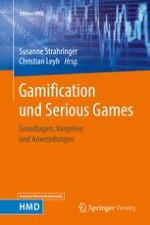2017 | OriginalPaper | Buchkapitel
8. Game-Based Learning, Serious Games, Business Games und Gamification –Lernförderliche Anwendungsszenarien, gewonnene Erkenntnisse und Handlungsempfehlungen
verfasst von : Axel Jacob, Frank Teuteberg
Erschienen in: Gamification und Serious Games
Verlag: Springer Fachmedien Wiesbaden
Aktivieren Sie unsere intelligente Suche, um passende Fachinhalte oder Patente zu finden.
Wählen Sie Textabschnitte aus um mit Künstlicher Intelligenz passenden Patente zu finden. powered by
Markieren Sie Textabschnitte, um KI-gestützt weitere passende Inhalte zu finden. powered by
